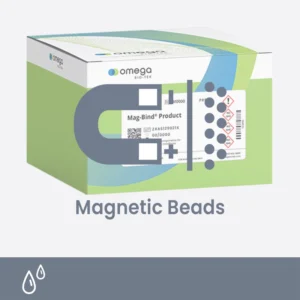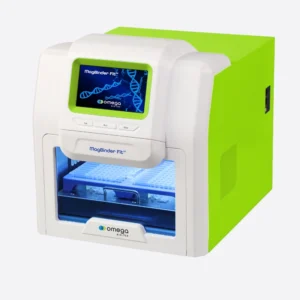Carisa Townsend1, Kiranmai Durvasula1, and Travis Butts1
- Omega Bio-tek, Inc, Norcross, GA 30071
Introduction
With advances in genomics research, personalized medicine, and sequencing-based technologies, there is a necessity for purification of high-quality genomic DNA from large volumes of blood. The rapidly growing landscape of biorepositories that store large amounts of DNA from an enormous number of biospecimens further fuels this need to find optimized solutions for reliable purification of DNA. The information derived from the purified DNA is crucial to health science research and facilitates drug discovery, biomarker discovery, clinical implementation projects, etc. For the success of these analyses and to derive relevant information, DNA extraction is the most critical step and must meet the criteria of extraction speed, yield and quality, as well as reproducibility. Many nucleic acid purification kits and automation workflows for processing blood samples in the volume range of 100-250 μL exist, but not many convenient, automated options exist for volumes as high as 2 mL without sample splitting. To fill this opening, Omega Bio-tek has developed a semi-automated solution on the MagBinder® Fit24 to extract DNA from large volumes of fresh or frozen blood. In this application note, we present this solution, along with verification studies on three different lots of blood to demonstrate the performance of the system. The performance of the automated system was evaluated based on how closely it represents the manual approach in terms of yield, purity, and integrity of DNA extracted.
Materials and Methods
DNA was extracted from 2 mL blood samples obtained from 3 lots of whole blood using Omega Bio-tek’s Mag-Bind® Blood DNA HV Kit (M3292) following either manufacturer’s manual protocol (n=3) or manufacturer’s protocol for the MagBinder® Fit24 (n=3). To prepare for extraction using the MagBinder® Fit24, a mastermix of AL Buffer and ProK is created and added to the blood samples for lysis. Lysis was carried out offline by incubating at 70°C for 25 minutes. After, all components are transferred to the Well 1 position on the cartridge and Mag-Bind® Particles CH are added before beginning automated extraction. Figure 1 shows the contents and volume of reagents that should be dispensed to each well position on the 5 mL cartridge (PB07-5-200) before adding the lysate. The MagBinder® Fit24 was programmed to perform various magnetic bead-based tasks as outlined by the Mag-Bind® Blood DNA HV protocol. The bind-wash-elute steps were performed in the 5 mL cartridge prepared earlier in the protocol. DNA was eluted in 400 μL of Elution Buffer.
Contents, Volumes, and Positions of Dispensed Reagents

Figure 1. MagBinder® Fit24 reagent cartridge positions, contents, and volumes for the Mag-Bind® Blood DNA HV Kit.
Extracted DNA was quantified using Thermo Scientific’s NanoDrop™ 2000c system. Absorbance measurements at 230, 260, and 280 nm were made to evaluate purity of the extracted DNA. Size and integrity of the isolated DNA was also analyzed using Agilent’s TapeStation® 2200 with a genomic DNA tape. The suitability of the extracted DNA for downstream applications was examined by performing qPCR using 10-fold and 100-fold dilutions.
Results and Discussion
The DNA yields determined via NanoDrop™ spectrophotometer are shown in Figure 2. Yields resulting from extraction using the MagBinder® Fit24 were consistently over 60 μg, while yields from the manual protocol ranged from 55.7-75.6 μg. Both the MagBinder® Fit24 and manual extraction methods resulted in exceptional purity ratios with A260/A280 and A260/A230 ratios consistently greater than 1.8. From this, it can be seen that automating DNA extraction with the MagBinder® Fit24 does not sacrifice yield or purity for convenience and performed consistently for all three lots of blood tested.
MagBinder® Fit24 Protocol Results in Consistently Higher Yields than Manual Protocol
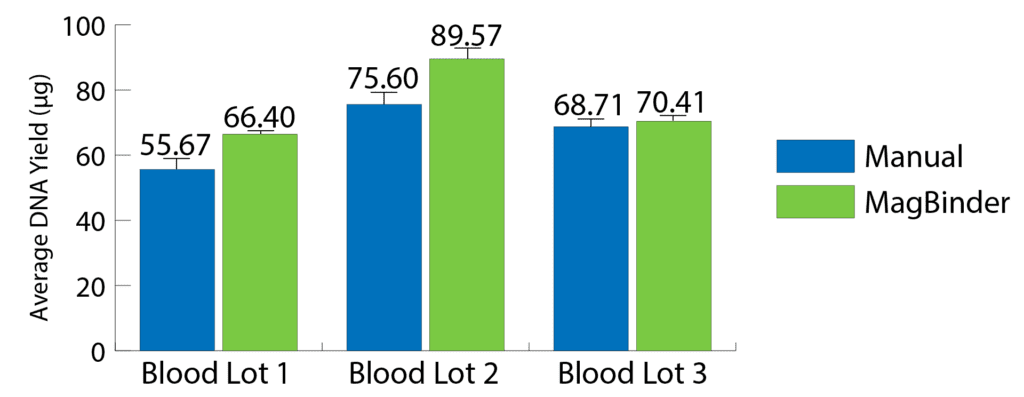
Figure 2. Average DNA yield from 2 mL whole blood purified using MagBinder® Fit24 and manual protocols.
Table 1. DNA extracted from 2 mL whole blood shows exceptional purity ratios for both MagBinder® Fit24 and manual extraction protocols.

DNA Extracted using the MagBinder® Fit24 is of High Integrity

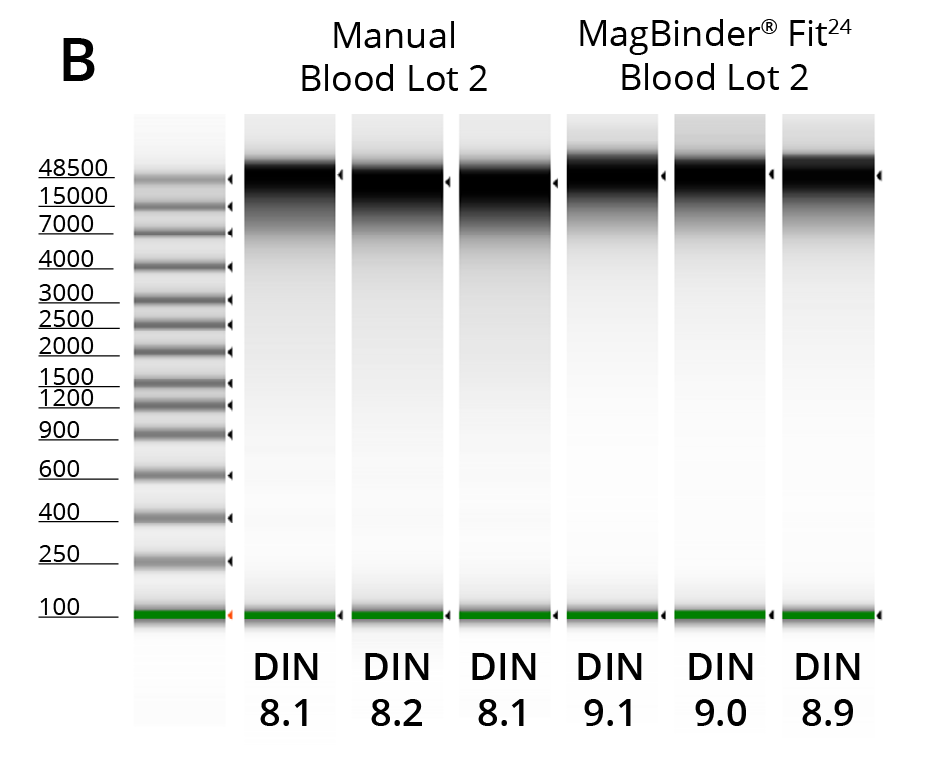
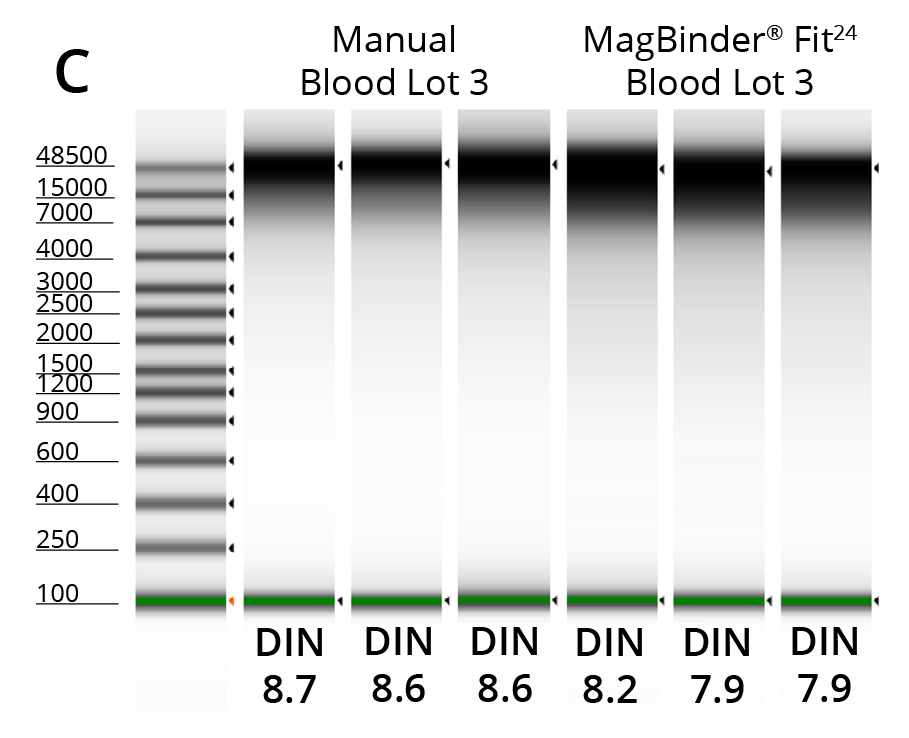
Figure 3. A, B, C) TapeStation analysis of DNA extracted from each lot of blood using the MagBinder® Fit24 showed DNA integrity higher than or comparable to DNA extracted using the manual protocol.
The purified DNA was also analyzed on TapeStation® to derive information about its size and integrity. The DNA Integrity Number (DIN) was calculated by the TapeStation® analysis software based on fragmentation; its typical range is 0-10, with a DIN of 10 representing the highest integrity. Figure 3 shows the TapeStation® analysis of blood samples from each lot and their corresponding DIN. The purified DNA from each sample migrated as a well-defined band; many samples migrated at or above the largest ladder peak at 48,500 bp. The average DIN value for DNA extracted using the Mag-Bind® Blood DNA HV Kit on the MagBinder® Fit24 was 8.6, suggesting highly intact DNA with no degradation, and the average DIN for the manual protocol was 8.3.
qPCR was performed on the extracted DNA using human-specific primers. The average Ct of 10-fold and 100-fold dilutions are shown in Figure 4. Typically, the Ct of samples whose concentration differs by a factor of 10 are ~3.3 cycles apart. The average ΔCt value between dilutions of DNA from the manual protocol and the MagBinder® Fit24 protocol were 3.0 and 3.1, respectively, suggesting little to no qPCR inhibition.
Conclusions
Automating Omega Bio-tek’s Mag-Bind® Blood DNA HV Kit on the MagBinder® Fit24 offers a streamlined purification solution to optimize protocols that may have previously been performed by hand without sacrifing yield, purity, integrity, or performance in applications downstream. With this workflow, twenty-four 2 mL whole blood samples can be processed in approximately 85 minutes. The robust performance of this workflow ensures high molecular weight DNA extraction, making it attractive for sequencing technologies requiring longer single molecule DNA fragments. The purified DNA was of significantly high quality, suitable for demanding downstream applications and biorepository needs.
Blood DNA Extracted Using the MagBinder® Fit24 is Suitable for Downstream Applications
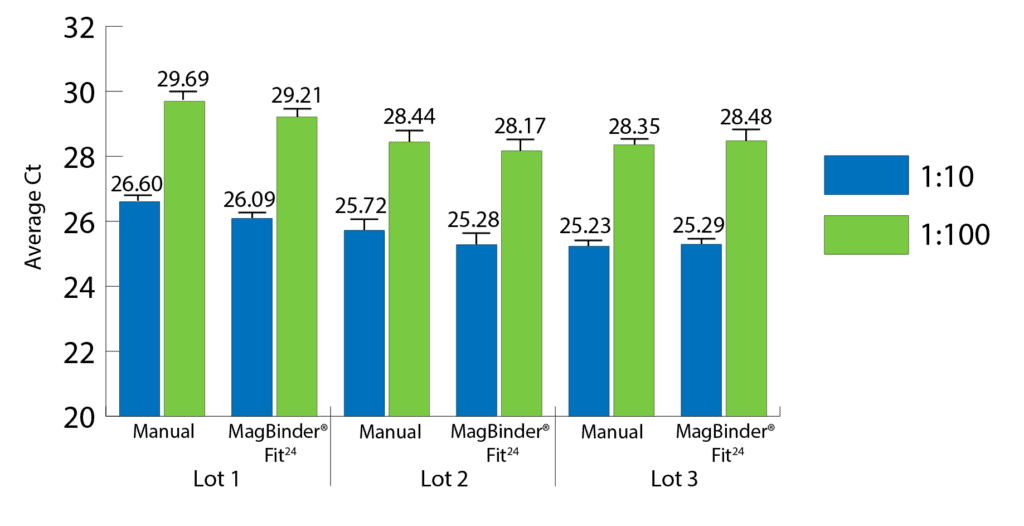
Figure 4. qPCR amplification of DNA extracted using the MagBinder® Fit24 showed little to no signs of inhibition, substantiating its suitability for use downstream.
Related Products
-
Blood and Bodily Fluids
Mag-Bind® Blood DNA HV Kit
$0.00 Select options This product has multiple variants. The options may be chosen on the product page

